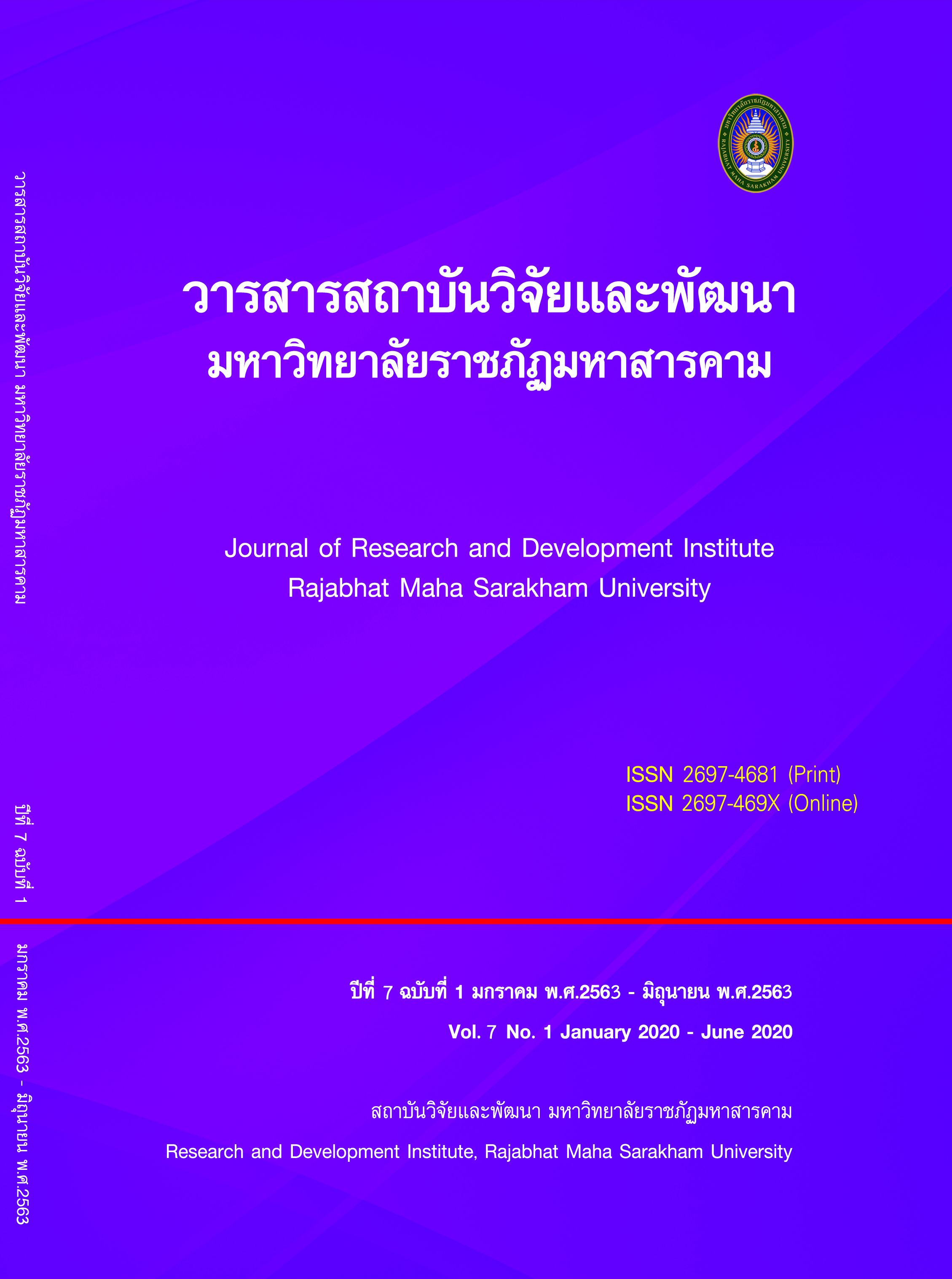Development of Desirable Characteristics of Students For being School of morality through action research : a case study of Phayakkaphumwittayakarn School
Keywords:
Development of Desirable Characteristics, School of morality, action researchAbstract
This research objectives were : 1) to study about the current situation and determine needs of desirable characteristics development of students in the extra large-size secondary school under MahaSarakham Office of Secondary Education Service Area 26 ; 2) to develop of desirable characteristics of students of Phayakkaphumwittayakarn School for being school of morality through action research and ; 3) to verify the result of the development of desirable characteristics of students in Phayakkaphumwittayakarn School for being school of morality. The research consisted 3 phases. The first phase was the study about the current situation and the expectation in the development of desirable characteristics of students for being school of morality, the second phase was the development of desirable characteristics of students for being school of morality through action research and the third phase was the verifying of the development result of desirable characteristics of students for being school of morality. The research instruments were the questionnaire, performance assessment, interview, observation and group meeting record form. The quantitative data analysis was enumerated to Mean and Standard Deviation, presented in the form of a composite table and Content Analysis was used for the quality data analysis. The results were as follows: (1) The study about the current situation and determine needs of desirable characteristics of students in the extra large-size secondary school under MahaSarakham Office of Secondary Education Service Area 26 on the discipline, learning attendance, commitment to work were in the low level and should be developed urgently. (2) The development result of desirable characteristics of students in Phayakkaphumwittayakarn School for being school of morality through Action Research was students had the highest level of behavior in all aspect. (3) To verify the result of development of desirable characteristics of students in Phayakkaphumwittayakarn School for being school of morality found that Phayakkaphumwittayakarn School is suitable for being a school of morality on discipline, pursuing learning and commitment to work.
References
References
Aroonsiri Janlon and Pamornphun Yurayat. (2017). Developing Guidelines to Enhance Students Desirable Characteristics for Schools under the Office of Udornthani Primary Education Service Area 1. Journal of Education, Mahasarakham University. 11 (3), 185-194.
Bunchom Sīsaʻāt. (2000). Preliminary research. 6th edition. Bangkok: Suveeriyasan.
Cannon, Jeff Scott. (2000). The Examination of School in Peril: A Look at Discipline and Community Participation. in and Urban School,” Masters Abstracts International. 38 (1): 12; February, 2000.
Chutikan Madthapato. (2013). Desirable Characteristics of Students in Khaonoiwittayakom School, Tart Province under Secondary Educational Service Area Office 17. Master of Education Thesis, Burapha University.
Kanchana Wattayu. (2001). Classroom research for the development of teaching and learning, Educational Administrators Development Institute, Ministry of Education. Bangkok: Ministry of Education.
Kemmis, S., & McTaggart, R. (1988). The action research planner. 3rd ed. Victoria: Deakin University Press.
Kitipong Sae jiaw. (2013). BOONNIYOM EDUCATION AND STUDENT’S EIGHT BASIC VIRTUES OF SUMMASIKKHA SCHOOLS. Master of Education Thesis, Silpakorn University.
Ministry of Culture. (2015). Song of 12 values. [online] http://www.m-culture.go.th/. [11 April 2017].
Moral School Center, Yuvasatirakhun Foundation. (2016). Moral school practice manual. 2nd Edition. Bangkok: Sahamit Printing and Publishing
Office of Academic and Educational Standards. (2010). Guidelines for Development, Measurement and Evaluation of Desirable Characteristics in the Basic Education Core Curriculum 2008. Bangkok: Printing House, The Agricultural Assembly of Thailand, Ltd.
Office of Academic and Educational Standards. (2011). The 8 basic virtues. Bangkok: Office of Academic and Educational Standards.
Phra Amnaj Autthakamo (Noinil). (2011). A STUDY ON THE DESIRABLE CHARACTERS OF STUDENTS AT SUKSASONGKROH BANGKRUAI SCHOOL BANGKRUAI DISTRICT IN NONTHABURI PROVINCE. Bachelor's Thesis. Chulalongkorn University.
Siri Thee-asana. (2007). “the Development of Internal Quality Assurance System of Private Vocational School Using Action Research: A case Study”. Journal of Research Methodology: JRM. 20 (3), 312-330.
Siriwimon Chuchipwatthana. (2015). “Learning Inquiry Behavior of Junior High School Students of the Schools of Ratchaburi Diocese in Ratchaburi Province”. Journal of Behavioral Science for Development. 7 (1), 199-214.
Sujittra Buakhan, Surachet Noirid and Chalongrut Intree. (2015). The Model of Desirable Characteristics of Secondary Private School Students Under Udonthani Primary Educational Service Area 1. Journal of Education, Mahasarakham University, 9 (Special Issue), 843-858.
Yajai Pongboriboon. (1994). Documentation for the seminar on Action Research: Teaching and Learning Development Models. Khon Kaen: Khon Kaen University.
Downloads
Published
How to Cite
Issue
Section
License
Articles that are published are copyrighted by the authors of the articles







